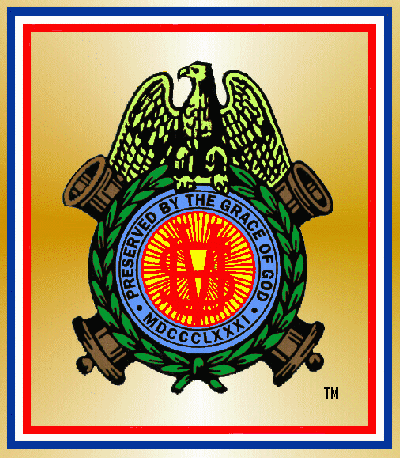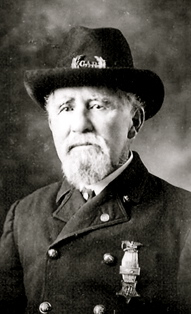Peter j Knapp
Sons of Union Veterans of the Civil War


Peter Jones Knapp Peter Jones Knapp was born at Sandusky, Ohio, June 2, 1842, and was one of 13 children. When he was 10 years old his father died, and he and an older brother kept the home together, working in the summer and going to school in the winter. At the age of 17, he started out to see the world, first going to Michigan, where he worked on his uncle's farm, and later going to Kansas, where a crop failure caused him to return, and he found work on a flat boat on the Missouri River.
In July 1861, after working on a farm for $10.00 per month, he went to see his brother. Being told that a recruiting sergeant had been in the village the day previous getting volunteers, and that several young men whom he knew had enlisted, he resolved to enlist himself. He and his nephew, Joseph Walter Knapp, enlisted on July 17, 1861 and were sworn into the U.S. service for three years or until the end of the war. He thus became a Private in Company H, 5th Regiment Iowa Volunteer Infantry.
His war experience started immediately. He was among the troops who, under General Fremont, marched to Springfield and drove the Confederates from the state. His own words tell in vivid language an experience of that winter: "We were quartered in the second story of a brick building. One night about 12 we were awakened, hurried across the ice bound river and rushed 15 miles over a road covered with sleet to Fayetteville, a county seat in hostile territory, to guard the cavalry camp while they went out and broke up the Confederate camp of Poindexter at Silver Creek, returning next day with 165 horses and 16 prisoners." In February, they started out and marched 128 miles to St. Charles, thence by boat to St. Louis, and finally to Cairo, Illinois, where Mr. Knapp had a severe attack of typhoid, and lay in barracks, the floor of which was covered with wet slime from one to four inches from the overflowing river. Writing of this, he says: "Later the sick were hauled after the army in wagons over 10 miles of the worst road I have ever seen. At length the army doctors concluded some of us were too sick to travel and we were taken and put in a back room of an abandoned store building, without medical attendance. I remained in this condition three weeks."
Getting a furlough for 30 days, he went to Iowa, where he saw his mother after an absence of two and a half years. After 20 days, he rejoined his regiment at the end of the siege of New Madrid, saw the surrender of Memphis, and under General Halleck helped in the capture of Corinth, May 28, 1862. He also had been in the Battle of Shiloh earlier in April. On the morning of September 18, at 2:00 a.m. they were aroused, told to get breakfast, strike tents and load wagons for the march. He tells the story: "A slow drizzling rain was falling and it was darker than a stack of black cats. I had been detailed as cook, and at once proceeded to put into execution with an old Dutch oven over a smoking fire of green wood, out in the darkness and the rain." He took part in the battle of Iuka, when 2,800 Union men opposed 11,000 Confederates. Out of 440 men in his regiment, 269 were killed or wounded, or over 60 percent. War records show that his regiment lost more in this one engagement of one hour and twenty minutes than any other regiment lost in any one engagement during the war. Under General Grant, he also was in various attempts to take Vicksburg, and which finally succeeded in 1863.
At the battle of Missionary Ridge, he was taken prisoner as he was going up the hill. He was taken to Andersonville and later transferred to prisons at Charleston, Libby, and Belle Island. After a terrible experience of 17 months, he along with a group of others, escaped. Starved, without even a shirt, and almost blind, so that he had to be led, they managed their way to the Union lines. It was interesting that these hard experiences of war did not cool his ardor for serving his country. After the close of the Civil War, he enlisted for service in the Indian War, in which he spent 15 months. Mr. Knapp took a great interest in the Grand Army of the Republic and was elected post commandant of the three different Posts in Kelso, as well as quartermaster. For 35 years, he had charge of the indigent soldiers' fund.
In 1870, he married Georgia Pearson at Muskegon, Michigan with whom he lived for over 53 years. In 1887, he came to Kelso, Washington where he engaged in the mill business, in which he had been interested in the South. Later, on his retirement, he was elected justice of the peace and police judge, in which offices he faithfully served for seven years. He resigned in 1922 due failing health. Though failing for the last five years, he always managed to get around until November 15, 1923, when he was stricken and confined to his bed for two months. Seeming to recover, he got up, but during the last week he failed rapidly, and on Sunday afternoon, April 13, 1924, he took a sudden change and passed away in his wife's arms at 5:40 o'clock.
Mr. Knapp was a good citizen ever interested in the welfare of the community. He was also a great patriot. In January 1862, he started a diary and although a young man of 20 years, he began it with these words: "Happy New Year. God grant that it may prove such to our sorely distracted country and that another New Year's morning may find us a united and prosperous people, defying the power of European despots, before whom we are no obliged by circumstances beyond our control to humble ourselves. May God give wisdom and strength to our rulers that they counsel wisely, so that this government, which has been the wonder of the world, may triumph over its many enemies, crush treason to the earth never to rise again and proving to the world that republican governments are capable of withstanding any storm which may gather on their political horizon." Later, while in camp, word came to his company that one man in every company was to be selected for West Point, and mentioning this, he adds: "Oh, how I should like to go. I would almost give my existence to go there for five years, for then I might be of some service to my country."
Mr. Knapp was the last of 13 children and is survived by his wife and a daughter, Mrs. May Elliott. Funeral services were conducted from the Kelso Presbyterian church, Wednesday, April 16, with final services at the Portland Crematorium. Peter Jones Knapp was reintered at Willamette National Cemetery on April 13, 2012.
Photograph and information submitted by Peter Jones Knapp's great great great niece, Alice Knapp, and from the April 15, 1924 Kelsonian, Kelso, Washington.
Peter Jones Knapp


